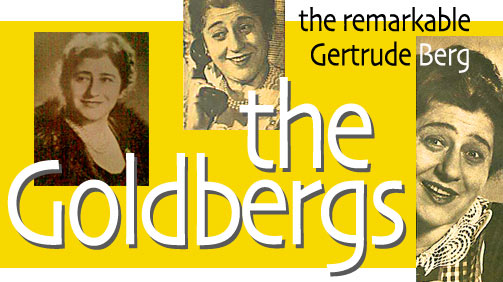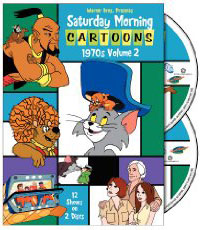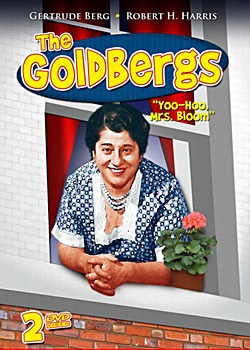


 |
 |
 |
||
|
by Billy Ingram
It all hinged on one woman - Gertrude Berg, a true multi-media pioneer. Beginning on network radio in 1930, The Goldbergs had a phenomenal seventeen year run, second only to Amos and Andy as the longest-running program of radio's golden years. A Broadway play and daily comic strip were also spun off from the show. The Goldbergs followed the adventures of Molly Goldberg, her husband Jake, and their family as they meandered through life's everyday challenges. Producer Gertrude Berg both wrote the scripts and portrayed Molly in the radio sitcom.
From 1930 until 1955, The Goldbergs was broadcast live. It's hard to imagine anyone writing and performing a live, top-rated network series for over twenty years, especially when you consider there were very few changes made in all that time. Life magazine said: "For millions of Americans, listening to The Goldbergs, a warm-hearted radio serial about a Jewish family, has been a happy ritual akin to slipping on a pair of comfortable old shoes that never seem to wear out."
The Goldbergs ended on radio in 1947, after earning Gertrude Berg national acclaim and millions of dollars. Berg took a stage version of her show called The Goldbergs, Molly and Me to Broadway in 1948 before deciding to tackle the latest technology. The move to television in 1949 was (at first) an easy one for The Goldbergs. This was the original "show about nothing," just the ordinary daily frustrations of life as seen through the eyes of patient, wise, resourceful Molly. For the first TV season on CBS, the show was the third most popular program on the air. The production was very successful in illuminating what the radio show presented so well for the mind's eye. That was no easy task, only a small number of radio sitcoms successfully transitioned to the small screen - and they all tried. Not even a woman with as much determination as Gertrude Berg could stop what was going on in Washington, DC in 1950. The Senate investigation into communists infiltrating our daily lives was in full swing, reaching deep into Hollywood. Writers and actors with left-leaning tendencies were labelled "controversial" and blacklisted—refused work by the networks and studios and even fired from existing contracts.
When it became apparent that neither network nor sponsor would budge, Berg reluctantly replaced Phillip Loeb (but kept him on the payroll at full salary) with actor Harold J. Stone when The Goldbergs returned to the air in February, 1952 on another network, NBC.
|
Molly
Goldberg
/ Gertrude Berg
Here's a 1953 sketch with Gertrude Berg as Molly and Milton Berle from the Texaco Theater.
|